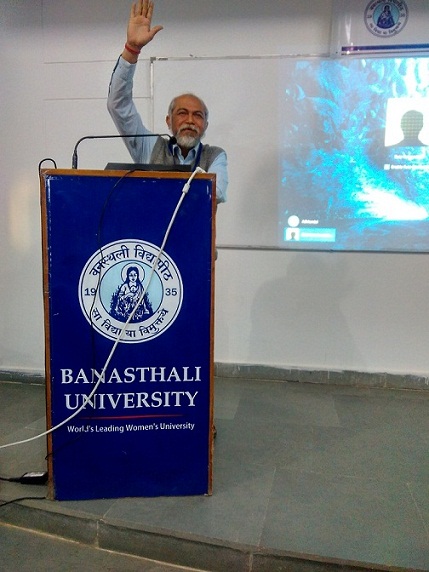One week FDP SCoTA-17 under PMMMNMTT MHRD GOI Inaugurated at Banasthali — Banasthali
To quote Indian Philosopher Jiddu Krishnamurti regarded globally as one of the greatest thinkers & teachers “Education can be transformed only by educating the educator, and not merely creating a new pattern, a new system of action.”

One week FDP SCoTA-17 under PMMMNMTT MHRD GOI Inaugurated at Banasthali
JAIPUR, India – Dec. 23, 2017 – PRLog — Banasthali Vidyapith which is a centre for Pandit Madan Mohan Malaviya National Mission on Teachers and Teaching PMMMNMTT is organizing a weeklong Faculty Development Program (FDP) during 23 – 28 December 2017 by the Department of Computer Science on Soft Computing Techniques and Applications SCoTA – 17.
Broadly speaking, Soft Computing includes Fuzzy logic, neural networks, genetic programming, Swarm intelligence and much more. The highly automated operating discipline in Chemical Process Plants and manufacturing industries calls for Fuzzy Logic while empirical emulators of fundamental models call for Neural Networks. Accelerated new product development demands genetic programming while advanced process optimization can be achieved by swarm intelligence which talks of consolidated behavior in distributed systems.
After the auspicious lamp lighting by dignitaries at CMS Auditorium, Prof Sarla Pareek Dean welcomed the participants and highlighted the objectives of the program. Prof GN Purohit who has several decades of experience, gave an overview of the evolution of Banasthali Vidyapith from 1935 till date and emphasized on the fivefold education model Panchmukhi Shiksa perfected at the institution and also the salient features of soft computing.
Dr A S Mandal Chief Scientist from CSIR CEERI Pilani alumnus of IIT Kanpur and IIT Delhi who was the Chief Guest for inauguration talked about top 10 emerging disruptive technologies which included open AI Ecosystem portends, Internet of Things – IoT going Nano, Autonomous vehicles shifting to high gear, opto genetics, organs on chips, nextgen batteries, perovskite solar cells, blockchain, visual data analytics, cognitive computing etc. The details shared by him on CEERI Smart water Grid for smart city project was truly an eye opener.
During the week, in addition to professors from Banasthali, experts from University of Hyderabad, JNU New Delhi, DRDO New Delhi, Delhi Technological University for Women, IIT Kanpur wfv etc would be delivering talks in the area of soft computing. Participants have come from various parts of India and Banasthali does not charge any registration fees for participation and provided free boarding and lodging including Travel allowance by AC 3 Tier by shortest route. Ms Monika Narang anchored the proceedings.
For more details about Banasthali seehttp://www.banasthali.org/
About Banasthali: The Institution which is also the largest fully residential women’s university in the world has played a big role in revolutionizing women’s education in the country for the last eight decades with a belief that there is a tremendous role of higher education in empowering the women. Banasthali has scripted numerous success stories in a wide range of fields, and stands tall among the citadels of learning in India today. Team Banasthali with Vice Chancellor J C Bose Memorial Award for eminent scientist recipient Prof Aditya Shastri a highly acclaimed alumnus of BITS Pilani, SUNY State University of New York Stony Brook and MIT USA is indeed racing forward to be the very best among global women universities. Proud to be Banasthali alumni who call themselves as Banasthalites can be found in all latitudes, longitudes and altitudes in all walks of life across the globe.




